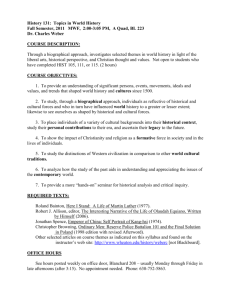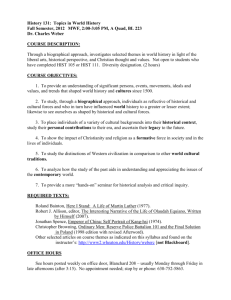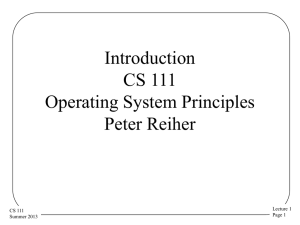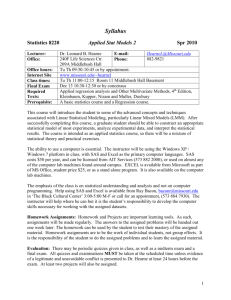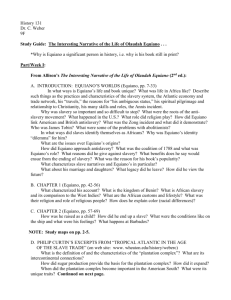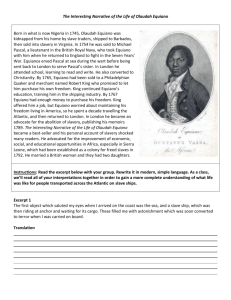History 131: Topics in World Civilization
advertisement
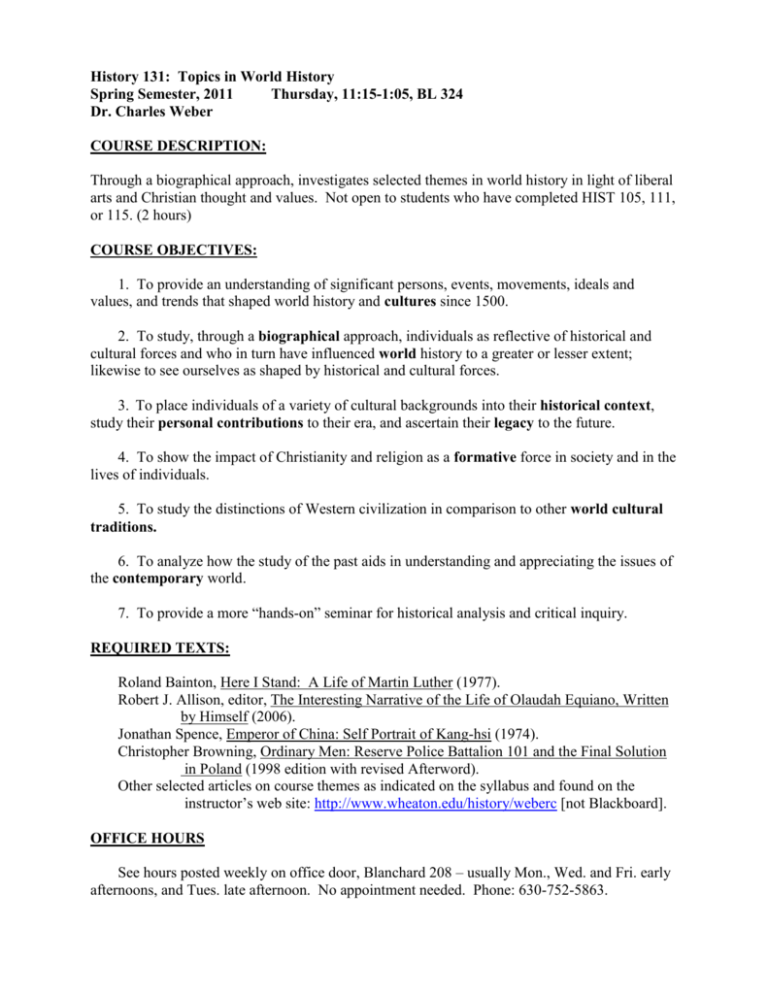
History 131: Topics in World History Spring Semester, 2011 Thursday, 11:15-1:05, BL 324 Dr. Charles Weber COURSE DESCRIPTION: Through a biographical approach, investigates selected themes in world history in light of liberal arts and Christian thought and values. Not open to students who have completed HIST 105, 111, or 115. (2 hours) COURSE OBJECTIVES: 1. To provide an understanding of significant persons, events, movements, ideals and values, and trends that shaped world history and cultures since 1500. 2. To study, through a biographical approach, individuals as reflective of historical and cultural forces and who in turn have influenced world history to a greater or lesser extent; likewise to see ourselves as shaped by historical and cultural forces. 3. To place individuals of a variety of cultural backgrounds into their historical context, study their personal contributions to their era, and ascertain their legacy to the future. 4. To show the impact of Christianity and religion as a formative force in society and in the lives of individuals. 5. To study the distinctions of Western civilization in comparison to other world cultural traditions. 6. To analyze how the study of the past aids in understanding and appreciating the issues of the contemporary world. 7. To provide a more “hands-on” seminar for historical analysis and critical inquiry. REQUIRED TEXTS: Roland Bainton, Here I Stand: A Life of Martin Luther (1977). Robert J. Allison, editor, The Interesting Narrative of the Life of Olaudah Equiano, Written by Himself (2006). Jonathan Spence, Emperor of China: Self Portrait of Kang-hsi (1974). Christopher Browning, Ordinary Men: Reserve Police Battalion 101 and the Final Solution in Poland (1998 edition with revised Afterword). Other selected articles on course themes as indicated on the syllabus and found on the instructor’s web site: http://www.wheaton.edu/history/weberc [not Blackboard]. OFFICE HOURS See hours posted weekly on office door, Blanchard 208 – usually Mon., Wed. and Fri. early afternoons, and Tues. late afternoon. No appointment needed. Phone: 630-752-5863. History 131, Spring, 2011 2 COURSE REQUIREMENTS AND PROCEDURES 1. Class activities are designed to (1) give an overall context for an understanding of modern world history from 1500; (2) introduce historical issues and methods; and (3) show the role of individuals in relation to historical forces. Therefore, familiarity with the reading assignment before each class on a specific topic listed on this syllabus is necessary and expected. One should come to class prepared to participate. 2. Much of the material in the reading assignments will not be reiterated in class, therefore you are encouraged to ask questions in class which arise from your readings. 3. Assignments and evaluation: a. Each week, to encourage preparation for class, there will be either a quiz or a homework assignment over that week’s assigned reading. Quizzes and homework assignments will alternate each week. b. There will be two exams, noncumulative. They will evaluate through objective questions and written answers the readings, videos, and class material on each book. c. A final essay will ask you to analyze the four main books assigned for the course around certain themes and in a comparative approach. The essay must include specific material from each book including the class material related to the books. A choice of themes will be given later in the course. Due: Thursday, May 5 by 10:30 A.M. in History Department office. d. Class participation will include general discussion, reaction papers and small group discussion and these will be evaluated and become part of the final grading. In addition, attendance at all classes (including one’s presence promptly at the time when class begins) is expected as is the completion of all assignments on time. In the event of two consecutive absences and/or three altogether a person will be asked to drop the course or be liable for significant grade reduction. Class participation is equivalent to one letter grade in one’s final course grade. 4. Grading will follow this pattern: a. Two exams combined b. Final essay c. Weekly quizzes/homework d. Class participation (mainly class comments, also attendance, and on time) = 40% = 20% = 30% = 10% 5. This course involves many assignments and due dates which must be strictly adhered to, including the time for the final exam. All homework assignments are due and all quizzes are given at the beginning of class, promptly at 11:15 at the start of class. No papers or quizzes will be given or accepted late. In addition, being on time for class is essential. 6. In the eventuality a test or assignment must be missed due to legitimate reasons, approval must be attained from the instructor in person at least 24 hours in advance of the due date. The make-up will consist of a written paper. History 131, Spring, 2011 3 7. Classroom courtesy. In order to encourage a learning atmosphere in class which shows courtesy to both students and instructor and which minimizes distractions, the following procedures will be followed: (a) the classroom is not a lunchroom and therefore snacks and meals should be eaten before or after class or during break, but not during the class itself; (b) beverages may be consumed during class, but containers should be opened before class and not during class; (c) class will begin promptly at the scheduled time and in order not to disrupt class members while the class is in session, once the door is closed latecomers will be asked to remain outside the classroom until the break time or until invited to enter the classroom by the instructor; (d) if a person needs to leave the classroom early it is appropriate to inform the instructor in advance and to sit near the door. These procedures are designed to make the classroom environment as equitable and pleasant as possible for all involved. 8. It is expected that course books and assignment material necessary for each week’s work will be brought to each class for use in class activities. 9. Extensive study guides are provided for each of the four required textbooks and the supplementary readings listed below. Homework assignments, quizzes, tests and class discussions are based on these study guides. The guides as well as the supplementary readings are available on the instructor’s web site http://www.wheaton.edu/history/weberc [not Blackboard]. Each student will be expected to make a personal copy of these study guides and readings in the early weeks of the course for study purposes. 10. Proper Academic Procedure: Academic dishonesty occurs when a student or any member of an academic community fails to truthfully represent the sources of their work, whether on tests, in papers, presentations and projects, or in any academic assignment. Academic dishonesty involves both stealing and lying, in that we steal the ideas and expressions of another contrary to their intent and, in representing them as our own we lie regarding their authorship. Academic dishonesty includes cheating, plagiarism, fabrication, any misrepresentation or deception related to assigned or voluntary academic work, any deliberate attempt to gain unfair advantage in completing requirements, and colluding, aiding or abetting the academic dishonesty of another student. Such dishonesty is a violation of our obligation to follow Christ in moral obedience and a violation of our shared commitment to the Wheaton College Community Covenant (http://www.wheaton.edu/welcome/aboutus_community.html). The College-wide policy on academic honesty is presented in the Student Handbook, [http://intra/studentresources/studenthandbook/student_handbook.pdf)] and in accord with that policy, incidents of academic dishonesty in this course will be dealt with decisively. All academic work involves engagement with and presentation of the ideas of others, and so students should not hesitate to use the work of others. However it is how that work is used that matters, and this instructor is very willing to assist students in this class in learning how to properly use and give credit for the work of others. 11. Additions or corrections to the following syllabus, as are necessary, will be made in class History 131, Spring, 2011 4 COURSE OUTLINE AND ASSIGNMENTS 1. January 13 The Historical Approach: The Universal Culture Pattern and the Role of the Individual in History and Society 2. January 20 I. Martin Luther: Product of a Medieval World View Bainton, chaps. 1-5 3. January 27 II. Martin Luther: A Renaissance-Reformation Figure and Leader of a New Movement Bainton, chaps. 6-10 4. February 3 III. Martin Luther: Contributions to the Modern World Bainton, chaps. 11-18 and additional pages Article on Luther’s legacy from Time’s commemorative issue “Luther: Giant of His Time and Ours”* 5. February 10 I. Equiano: Participant in the Atlantic System and the Cultural Forces of the Eighteenth Century Equiano, pp. 1-69 Article on the Atlantic trading system by Philip Curtin: “The Tropical Atlantic in the Age of the Slave Trade”* 6. February 17 II. Equiano and the Age of Revolutions: The Atlantic Trade and Slave System Equiano, pp. 70-182 7. February 24 III. Equiano: Christian Providence in an Era of Change Equiano, pp. 183-214 Documents on Enlightenment political ideals: Declaration of Independence, French Declaration of Rights of Man and the Citizen, and Declaration of the Rights of Woman and the Female Citizen* 8. March 3 I. Kang-hsi: Heir of an Ancient Chinese Tradition Spence’s Emperor of China, pp. xi through pictures, 141-175 Chapters on Chinese history and culture from World of Asia* [Spring Break] 9. March 17 Mid-term Exam over Units 1-7 *Available on instructor’s web site: http://www.wheaton.edu/history/weberc [not Blackboard] History 131, Spring, 2011 5 10. March 24 II. Kang-hsi in an Era of Absolutism Worldwide Spence, pp. 3-89 11. March 31 III. Kang-hsi and the Role of Christianity in China and the Future of China Spence, pp. 93-139 Chapter on Christianity in China, “Wise Men from the West” by G. Thompson Brown (from Christianity in the People’s Republic of China)* 12. April 7 I. Background to Ordinary Men: Modern Nationalism and the Rise of Communism and Fascism Browning, pp. xv-54 Article on Fascism by Mussolini* 13. April 14 II. Ordinary Men and the Heyday of Nazism and the Holocaust Browning, pp. 55-96, 120-142 14. April 21 III. Ordinary Men and Postwar Responses to Nazism and the Shaping of the Cold War Browning, pp. 143-223 Selection by Victoria Barnett on “Christians and the Holocaust”* 15. April 28 FINAL EXAM ON UNITS 8 and 10-14 Thursday, May 5– Final essay due by 10:30 a.m. in History Department office *Available on instructor’s web site: http://www.wheaton.edu/history/weberc.
